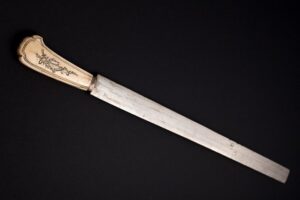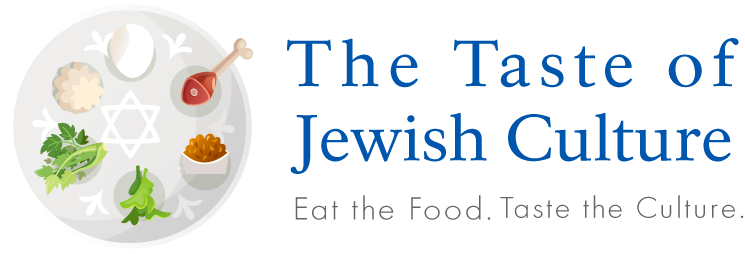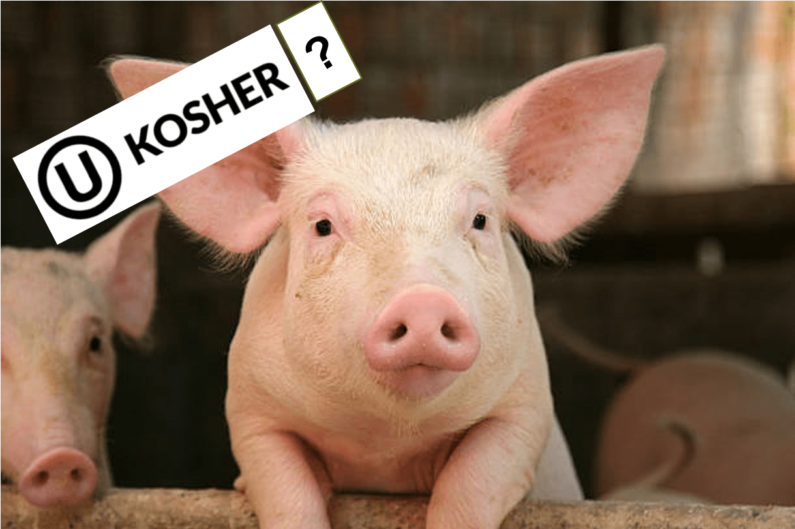“When I was a little boy, I ate real kosher meat, not like this. It was tasty, it was greasy, and it was great.” “What kind of meat was it?” I ask. “It was pork,” replies Grigorii. “There are special butchers for pigs. Otherwise their meat is not kosher.”(1)“Soviet Jewish Foodways: Transformation through Detabooization,” Gennady Estraikh, in Global Jewish Foodways: A History, eds. Hasia R. Diner & Simone Cinotto
As strange as the idea of kosher pork may sound, numerous oral history testimonies of Jews who lived in the USSR during the mid-20th century supply us with quotes similar to the one above. While such notions are fascinating on their own, they become more so when we realize how much they say about Jewish history, and about how Jewish Food helps us triumph over anti-Jewish hatred.
Kosher Pork Shows Soviet Success
For some reason, historically, pork has always been a more taboo food for Jews than any other non-kosher meat. So the fact that so many Jews who lived in the Soviet Union ate pig (and still do, in many cases) indicates one of that country’s great “successes.” In the span of a single generation, the bulk of their religious knowledge and practice was wiped clean from the consciousness of most Soviet Jews. As Gennady Estraikh points out in the same article I quoted from above, Ashkenazi Jews showed the greatest decline in religiosity in the whole country, a shocking 21:1 ratio of believers in their fifties to those aged 16-19 in the late 1930s. (By comparison, that ratio for Russian Orthodox Christians was 2.4:1 and for Muslims 1.8:1 at the same time.)
In my Food Talk “They Tried to Kill Us, We Won, Let’s Eat” I explore the interrelations between Jewish Food and antisemitism. I point out how, in some ways, the Soviets were more effective in their attack on our religion than the Nazis were. The Germans murdered 6 million Jewish bodies, but the Russians kept our bodies alive while killing our souls. Almost.
But it Ultimately Shows Soviet Failure

Soviet Jews also frequently ate their pork in exceptional ways. Some used special plates for it, ate it by a window instead of at the table, or only ate it when the older — more religious — generation was not present. Others remarkably reported eating only meat from the front half of the pig! Generally, Ashkenazi Jews only eat meats from the front half of a cow, avoiding the entire rear half due to the prohibition on eating the sciatic nerve. Those in Russia who reported this had no idea the reason, suggesting it was cleaner, or because the rear is where the mother pig gives birth. But incredibly, even without knowing why they kept these practices, the fingerprints of Jewish ritual remained imprinted even on the utterly treif food they consumed!
Other similar examples are peppered through the testimonies. Some Russian Jews kept separate pots for milk and meat, though chalked this practice up to practical cooking needs. One woman spoke of a type of the beloved Jewish dish chulent, that is typically slow-cooked overnight for Shabbat lunch, due to the prohibition against cooking on the Sabbath. She, however, prepared it even during weekdays, and assumed it was cooked that long merely for reasons of taste.
With the collapse of the Soviet Union, and the accompanying freedom to practice Judaism, anyone who desired to return to their roots could do so. Many, of course, have not. But for anyone who chose to do so, they needed a starting point, an entry into connecting to their past. And their Jewish Food provided that. Looking into practices that remained unique to their family and friends, odd ways of preparing food or strange culinary taboos gave them something to latch on to as genuinely — albeit only vaguely — Jewish. With their newfound freedom, they could dig in to those customs, and learn the reasons for them, as well as where they had become denatured.
In the long run, so-called kosher pork shows us how Jewish Food triumphs over antisemitism.
Footnotes
| ↑1 | “Soviet Jewish Foodways: Transformation through Detabooization,” Gennady Estraikh, in Global Jewish Foodways: A History, eds. Hasia R. Diner & Simone Cinotto |
|---|---|
| ↑2 | “Salo on Challah: Soviet Jews’ Experience of Food in the 1920s-1950s,” Anna Shternshis, in Jews and Their Foodways, ed. Anat Helman |






Cynthia Clampitt
Fascinating.
As for that “for some reason,” my research as a food historian points to Hellenization bringing about considering pork “the worst.” Eating pork was the centerpiece of Hellenic culture — Alexander the Great adored it — it was what you ate to prove you were really engaged with Hellenic culture. The Romans, also quite Hellenized, loved pork, too, but they didn’t force Jews to eat it — but the Seleucid king Antiochus IV did. He mandated that you had to eat pork to prove loyalty — or you would be killed. So pork and not eating it became the centerpiece of Jewish identity at that time. (You may already know this, but it didn’t appear above, so thought I’d share.)
FunJoel
Thanks Cynthia! (And thanks for both reading and commenting.)
To be clear, I’m sure that played a part, but I think it was likely a combination of many things. If you have not read it, a good book that discusses this and other related topics is Jordan D. Rosenblum’s The Jewish Dietary Laws in the Ancient World.
How about we make the next season of ‘Nobody Wants This’ a little less antisemitic? | The jewish world seen by...
[…] trials of the Jewish diaspora. And it could also tie in the prosciutto incident; many Soviet Jews actually ate pork. Perhaps she and Joanne can bond over their shared guilty pleasure: […]